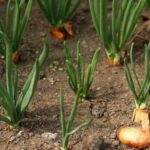Mushroom manure, also known as mushroom compost or mushroom soil, is a unique and valuable resource for vegetable gardeners. This organic material, made from the byproducts of mushroom cultivation, is highly beneficial in promoting plant growth and overall soil health. In this introductory section, we will dive into the composition of mushroom manure and explore why it is a popular choice among gardeners.
Firstly, let’s define what exactly mushroom manure is. Mushroom manure is the leftover substrate that mushrooms are grown in. It consists of various organic materials such as straw, corn cobs, peat moss, and poultry or horse manure. These materials undergo a process called composting or pasteurization to create an ideal environment for mushroom growth. What remains after the mushrooms are harvested is a nutrient-rich compost that can be used to enhance soil quality.
One of the key reasons why mushroom manure is favored in vegetable gardens is its numerous benefits for plant growth. This organic material enriches the soil with essential nutrients like nitrogen, phosphorus, potassium (NPK), as well as other vital minerals and trace elements. Additionally, mushroom manure improves soil structure, water retention capacity, and drainage properties. Its high organic matter content also encourages beneficial microbial activity in the soil, fostering healthy root development and overall plant vigor.
By incorporating mushroom manure into your vegetable garden, you can provide your plants with a natural boost of nutrition while improving the long-term health of your soil. In the following sections of this article, we will delve deeper into understanding its nutritional value for vegetables and provide practical tips on application methods that yield optimal results. So let’s get started on uncovering the secrets behind harnessing the power of mushroom manure in your own vegetable garden.
Understanding the Nutritional Value of Mushroom Manure for Vegetables
Mushroom manure is not only a great organic material for enriching soil, but it also provides essential nutrients that promote healthy growth in vegetable plants. Understanding the nutritional value of mushroom manure can help gardeners make informed decisions about incorporating it into their vegetable gardens.
One of the key benefits of mushroom manure is its rich nutrient content. It contains a variety of vitamins, minerals, and organic matter that are essential for plant growth. Some of the important nutrients found in mushroom manure include nitrogen, phosphorus, potassium, calcium, magnesium, and iron.
Nitrogen is crucial for promoting leafy growth and overall plant vigor. Phosphorus supports root development and helps with flower and fruit formation. Potassium contributes to disease resistance and enhances the flavor of vegetables. Calcium helps prevent blossom end rot in tomatoes and other fruits. Magnesium aids in chlorophyll production and photosynthesis, while iron is necessary for proper cell function.
In addition to these essential nutrients, mushroom manure also contains organic matter that improves soil structure and fertility. The organic matter acts as a sponge, holding moisture in the soil while still allowing for good drainage. It also encourages beneficial microbial activity in the soil, which helps break down organic materials into forms that plants can easily absorb.
Overall, the nutrient composition of mushroom manure makes it an excellent choice for enriching vegetable gardens. Its balanced blend of nutrients promotes healthy plant growth and increases crop yield. By understanding the nutritional value of mushroom manure, gardeners can make well-informed decisions on how to incorporate it effectively into their vegetable gardens.
| Nutrient | Function |
|---|---|
| Nitrogen | Promotes leafy growth |
| Phosphorus | Aids in root development and flower/fruit formation |
| Potassium | Enhances disease resistance and flavor |
| Calcium | Prevents blossom end rot in tomatoes and other fruits |
| Magnesium | Aids in chlorophyll production and photosynthesis |
| Iron | Necessary for proper cell function |
Step-by-Step Guide
Mushroom manure is an excellent organic fertilizer for vegetable gardens. Its rich nutrient content and organic matter can greatly benefit vegetable growth and overall soil health. If you’re interested in using mushroom manure in your own vegetable garden, here is a step-by-step guide to help you incorporate it effectively.
- Determine the right timing: It’s important to apply mushroom manure at the right time. The best time to incorporate it into your vegetable garden is during the fall or early spring, before planting. This allows enough time for the manure to decompose and release its nutrients into the soil.
- Prepare the soil: Before applying mushroom manure, ensure that your soil is ready to receive it. Remove any weeds or debris from the garden bed, and loosen the soil with a garden fork or tiller. This will create an optimal environment for nutrient absorption by the plants’ roots.
- Calculate the amount: The amount of mushroom manure needed depends on several factors, including the size of your garden and the specific vegetables you are growing. A general guideline is to apply 25-50 pounds of mushroom manure per 100 square feet of garden area. However, it’s always a good idea to conduct a soil test or consult with a local agricultural extension office for specific recommendations based on your soil conditions.
- Apply evenly: Spread a layer of mushroom manure evenly over your prepared garden bed. Aim for approximately 1-2 inches of thickness across the entire area. Avoid concentrated piles as they may burn plant roots or create uneven nutrient distribution.
- Mix thoroughly: Use a rake or garden fork to thoroughly mix the mushroom manure into the top few inches of soil. This helps distribute nutrients more evenly and promotes better root penetration. Take care not to disturb plant roots if you have already started growing vegetables in your garden.
- Water and wait: After incorporating mushroom manure into your vegetable garden, water the area thoroughly to help activate the nutrients and settle the soil. Throughout the growing season, ensure your garden receives adequate moisture to support optimal nutrient uptake by the plants.
| Step | Instructions |
|---|---|
| 1 | Determine the right timing: Apply mushroom manure in fall or early spring. |
| 2 | Prepare the soil: Remove weeds and debris, loosen soil with a garden fork or tiller. |
| 3 | Calculate the amount: Apply 25-50 pounds of mushroom manure per 100 square feet. |
By following these steps, you can effectively incorporate mushroom manure into your vegetable garden and reap its many benefits. Remember to always follow safety precautions when handling any organic fertilizer, including wearing gloves and wash your hands after application. Happy gardening.
Mushroom Manure vs. Other Organic Fertilizers
When it comes to choosing the best organic fertilizer for vegetable gardens, there are various options available. One popular choice is mushroom manure, but how does it compare to other organic fertilizers? Let’s take a closer look at the advantages and disadvantages of mushroom manure compared to compost or traditional animal manure.
One key advantage of using mushroom manure is its nutrient content. Mushroom manure is rich in essential nutrients that promote healthy vegetable growth. It contains a variety of vitamins and minerals, including potassium, phosphorus, nitrogen, calcium, and magnesium. These nutrients support root development, flower production, and overall plant vigor.
Additionally, mushroom manure is high in organic matter. This organic matter improves soil structure by enhancing moisture retention and drainage capabilities. It also encourages beneficial microbial activity in the soil, which aids in nutrient cycling and decomposition of organic matter.
Compared to compost or traditional animal manure, mushroom manure has some unique benefits. While compost provides similar benefits regarding soil structure improvement and nutrient availability, it may not always have the same concentration and balance of nutrients as mushroom manure. On the other hand, traditional animal manure can be too strong for some vegetable crops due to its higher nitrogen content or potential weed seed contamination.
Common Mistakes to Avoid when Using Mushroom Manure in Vegetable Gardens
When incorporating mushroom manure into vegetable gardens, there are several common mistakes that gardeners should be aware of in order to ensure optimal results. By avoiding these pitfalls, gardeners can maximize the benefits of mushroom manure and prevent any potential issues.
One common mistake when using mushroom manure is over-application. While mushroom manure is a valuable organic fertilizer, it is important to use it in moderation. Over-applying mushroom manure can lead to nutrient imbalances in the soil and may even burn the roots of the vegetables. To avoid this, it is recommended to follow the specific instructions provided by the manufacturer or consult with a gardening expert.
Another mistake to avoid is not considering the pH balance of the soil. Mushroom manure tends to have a higher pH level, which can lead to alkaline soil conditions. Most vegetables prefer slightly acidic soil, so it is crucial to test the pH levels regularly and adjust them if necessary. Adding organic matter such as compost or peat moss can help balance out the pH and create an optimal growing environment for vegetables.
Improper decomposition of mushroom manure can also be problematic. If the manure has not fully decomposed before being added to the vegetable garden, it may contain high levels of ammonia that can harm plants. It is important to ensure that mushroom manure is fully matured and aged before use. This can typically take anywhere from six months to a year, depending on the specific composting process used.
To avoid these mistakes, here are some tips for properly using mushroom manure in vegetable gardens:
- Follow recommended application rates: Use only as much mushroom manure as needed for your specific vegetable crops.
- Test your soil: Regularly monitor and adjust the pH levels of your soil to maintain an optimal growing environment for vegetables.
- Compost or age your mushroom manure: Allow enough time for proper decomposition before applying it to your vegetable garden.
- Monitor plant health: Keep a close eye on your vegetables for any signs of nutrient deficiencies or imbalances, as well as any negative reactions to the mushroom manure.
- Seek expert advice when needed: If you are unsure about how to best utilize mushroom manure in your specific garden, consult with a gardening expert or agricultural extension office for guidance.
By avoiding these common mistakes and following these tips, gardeners can successfully incorporate mushroom manure into their vegetable gardens and reap the numerous benefits it provides.
Tips for Maximizing the Benefits of Mushroom Manure in Your Vegetable Garden
In order to maximize the benefits of mushroom manure in your vegetable garden, there are several key tips and strategies to keep in mind. By implementing these best practices, you can optimize vegetable growth, enhance soil health, and ensure that you are making the most out of this organic fertilizer option.
One important tip is to consider companion planting in your vegetable garden. Companion planting involves growing certain plants together that can benefit one another through natural pest control or nutrient sharing. When using mushroom manure, consider pairing it with companion plants that have similar nutrient needs or compatible growth habits. For example, legumes such as beans and peas can fix nitrogen in the soil, which can help optimize the available nutrients from the mushroom manure for other vegetable crops.
Another strategy to maximize the benefits of mushroom manure is to practice crop rotation. Crop rotation involves changing the location of different plant families within your garden over time.
This helps prevent nutrient depletion by reducing the likelihood of pests and diseases specific to certain plants from building up in the soil. By rotating crops regularly and including mushroom manure in between rotations, you can maintain a healthy balance of nutrients in your soil and avoid issues caused by continuous planting of vegetables from the same family.
Proper watering techniques are also crucial when using mushroom manure in your vegetable garden. While mushrooms have a high water content, excessive moisture can lead to problems such as root rot or fungal diseases. It is important to water your vegetable garden consistently but not excessively. Monitor the moisture levels in the soil and adjust accordingly based on weather conditions and specific plant needs.
By following these tips for maximizing the benefits of mushroom manure in your vegetable garden, you can create an optimal environment for healthy plant growth and abundant harvests. Remember to research specific recommendations for different vegetables and adapt these strategies according to your unique gardening conditions. With proper care and attention, you can harness the full potential of mushroom manure and enjoy the rewards of a thriving vegetable garden.
Potential Risks and Precautions Associated with Mushroom Manure in Vegetable Gardens
Potential Risks of Using Mushroom Manure
While mushroom manure offers numerous benefits for vegetable gardens, it is important to be aware of the potential risks associated with its usage. One potential risk is the presence of contaminants in the mushroom manure. This can include pathogens, heavy metals, or residual pesticides that were used in the growing process. It is crucial to ensure that the mushroom manure used is sourced from reputable suppliers who follow proper safety protocols and regularly test their products for contaminants.
Another risk to consider is the impact on soil pH levels. Mushroom manure has a tendency to increase soil alkalinity due to its high lime content. This can create an unsuitable environment for certain plants that prefer more acidic soil conditions. Before incorporating mushroom manure into your vegetable garden, it is recommended to test your soil pH and adjust it accordingly if necessary.
Precautions when Using Mushroom Manure
To mitigate these risks and ensure a successful vegetable garden, there are several precautions gardeners should take when using mushroom manure. First and foremost, it is essential to source high-quality mushroom manure from reputable suppliers or local mushroom farms that follow strict quality control measures. This will help minimize the chances of contamination and ensure the product’s safety.
Additionally, it is crucial to properly compost or age the fresh mushroom manure before applying it to your vegetable garden. Composting or aging helps break down any potential pathogens or toxins present in the raw manure while improving its overall nutrient availability for plants. Aim for a composting period of at least 2-4 weeks before using the mushroom manure in your garden.
Lastly, keep in mind the importance of moderation when applying mushroom manure. While it is rich in nutrients, excessive use can lead to nutrient imbalances and excessive foliage growth at the expense of fruit yield. Adhere to recommended application rates based on specific vegetables and avoid over-application to maintain a healthy balance in your garden.
By taking these precautions, you can minimize the risks associated with mushroom manure usage and ensure the well-being of your vegetable garden.
Success Stories
Organic tomatoes thriving with mushroom manure
One success story comes from a gardener named Lisa, who decided to incorporate mushroom manure into her vegetable garden to see if it would make a difference in her tomato plants. She was amazed at the results. The tomato plants grew larger and healthier than ever before, with vibrant green leaves and abundant fruit. Lisa believes that the nutrient-rich composition of the mushroom manure played a significant role in the success of her tomato crop.
Bountiful harvests of leafy greens
Another testimonial comes from John, an avid vegetable gardener who experimented with using mushroom manure on his leafy greens. He noted a considerable increase in both the quantity and quality of his spinach and lettuce crops. The plants grew vigorously, producing large, tender leaves that were packed with flavor. John attributes this success to the high organic matter content in mushroom manure, which improved soil structure and provided essential nutrients for healthy growth.
Robust herbs flourishing with mushroom manure
Mushroom manure also proved beneficial for herb gardens as demonstrated by Sarah’s experience. She had struggled to grow robust herbs in her garden until she decided to try incorporating mushroom manure into the soil. Soon after, her basil, rosemary, and thyme plants flourished and developed intense flavors. Sarah believes that the rich organic matter and balanced nutrient profile of mushroom manure were crucial factors in achieving such vigorous herb growth.
These success stories highlight how mushroom manure can be incredibly effective in enhancing vegetable gardening outcomes. By providing essential nutrients and improving soil health, mushroom manure has proven its worth among gardeners seeking optimal plant growth and bountiful harvests.
Frequently Asked Questions (FAQ) about Using Mushroom Manure in Vegetable Gardens
As the use of mushroom manure in vegetable gardens becomes more popular, it is natural for gardeners to have questions and concerns about its application and benefits. In this section, we will address some of the most frequently asked questions about using mushroom manure in vegetable gardens.
- Q1: Can I use fresh mushroom manure directly on my vegetable plants?
- A: No, it is not recommended to use fresh mushroom manure directly on your vegetable plants. Fresh manure contains high levels of nitrogen, which can burn and damage delicate vegetables. It is important to age or compost the mushroom manure before applying it to your garden. This composting process allows the nitrogen to break down into a more plant-friendly form, preventing any harm to your vegetables.
- Q2: How much mushroom manure should I use in my vegetable garden?
- A: The amount of mushroom manure you should use depends on several factors, such as the size of your garden and the nutrient needs of your vegetables. As a general guideline, you can apply a layer of 1-2 inches of aged or composted mushroom manure over the topsoil before planting.
However, it is essential to conduct a soil test first to determine the exact nutrient requirements of your garden. This will help you make an informed decision about the quantity of mushroom manure needed. - Q3: Can I mix other organic fertilizers with mushroom manure?
- A: Yes, you can mix other organic fertilizers with mushroom manure when preparing your soil. Compost or well-rotted animal manures are excellent choices to mix with mushroom manure. Combining different organic fertilizers helps create a balanced and nutrient-rich soil environment for your vegetables. However, it is crucial to follow recommended mixing ratios and avoid over-applying any type of fertilizer, including mushroom manure, as excessive nutrients can be harmful to plants.
- Q4: Is mushroom manure safe for organic vegetable gardening?
- A: Yes, mushroom manure is generally considered safe for organic vegetable gardening. However, it is important to ensure that the mushrooms were grown in a controlled environment without the use of harmful chemicals or pesticides. Organic certification standards require that mushroom manure meets specific criteria, so look for certified organic or locally sourced options to ensure the safety and purity of the product.
By addressing these frequently asked questions about using mushroom manure in vegetable gardens, we hope to provide clarity and guidance for gardeners interested in incorporating this beneficial fertilizer into their growing practices. Remember to always consult gardening experts or conduct further research if you have specific concerns or doubts about using mushroom manure in your vegetable garden.
Conclusion
In conclusion, mushroom manure is a highly beneficial and versatile organic fertilizer for vegetable gardens. Its nutrient-rich composition can greatly enhance the growth and productivity of vegetables, providing them with essential vitamins, minerals, and organic matter. By incorporating mushroom manure into your gardening routine, you can expect healthier plants, higher yields, and improved soil quality.
Throughout this article, we have explored the numerous benefits of using mushroom manure in vegetable gardens. We have learned about its nutritional value and how it supports optimal vegetable growth. Additionally, we have provided step-by-step instructions on how to properly prepare and apply mushroom manure in your garden, along with tips for maximizing its benefits.
When comparing mushroom manure to other organic fertilizers like compost or manure, we have seen that each option has its advantages and disadvantages. Mushroom manure stands out due to its balanced nutrient content and ability to improve soil structure. However, it is crucial to avoid common mistakes such as over-application or pH imbalance when using this fertilizer.
While there may be potential risks associated with mushroom manure usage if not handled properly, following safety guidelines can mitigate any potential drawbacks. To further underline the effectiveness of this organic fertilizer, success stories from gardeners who achieved remarkable results have been shared.
In summary, adding mushroom manure to your vegetable garden can provide numerous benefits while considering certain precautions. The final decision rests with you as a gardener, but I encourage you to give it a try – the rewards of healthier plants and bountiful harvests are well worth it.

If you’re looking to get into vegetable gardening, or are just looking for some tips on how to make your current garden better, then you’ve come to the right place! My name is Ethel and I have been gardening for years. In this blog, I’m going to share with you some of my best tips on how to create a successful vegetable garden.





